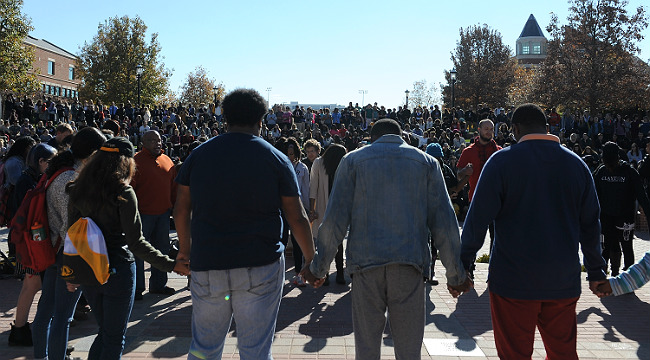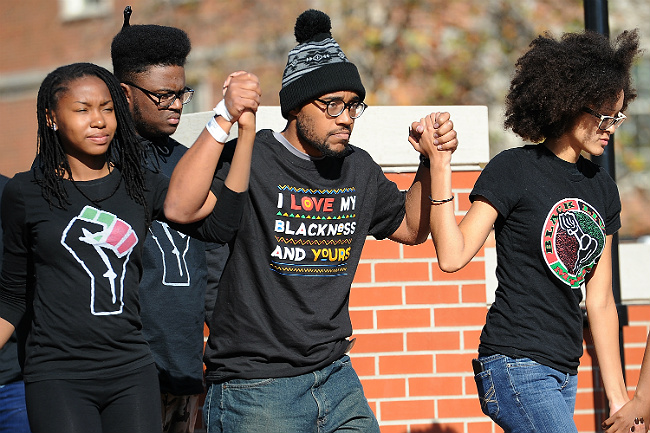
It’s been 15 months since Michael Brown was shot and killed by a police officer in Ferguson, Missouri — an event that triggered a new wave of discussion and protests across the country about systemic racism. The University of Missouri’s main campus is in Columbia, a two-hour drive away from Ferguson, so it had a more direct connection with the incident and its aftermath than most colleges.
But minority students haven’t had to make that drive to experience racism firsthand — they’ve had it shoved in their faces right on campus. And after weeks of protesting, the Missouri football team threw its weight behind the protests, and won a resounding victory with school president Tim Wolfe resigning on Monday.
Let’s trace back the events that led to this point:
August 9, 2014: Michael Brown is shot and killed in Ferguson.
August 16, 2014: MU graduate student Jonathan Butler (remember that name) attends Ferguson protests.
August 17, 2014: The first “Hands Up, Don’t Shoot” protest is held on MU’s campus, led by Butler after his return from Ferguson.
August 16-18, 2014: Two Missouri students are arrested, detained for hours, and released without being charged or read their rights while attending protests in Ferguson.
August 24, 2014: Columbia is the first municipality in the state of Missouri to require body cameras on all police officers on patrol.
August 27, 2014: Protests continue on MU’s campus, with a silent “Hands Up, Don’t Shoot” march completing without any violence.
December 12, 2014: MU students stage a “Die-In” protest at the Daniel Boone City Building in Columbia. Previously, all student protests had been on campus.
March 17, 2015: Racism protests begin to focus inward, as a heated campus forum is called with University Chancellor Bowen Loftin to address racial discrimination and hate crimes on campus. No specific promises on action are made.

September 12: Missouri Student Association President Payton Head claims in a Facebook post that he was harassed on the street by students in a truck yelling racial slurs at him. The MU administration took no public action.
October 5: The Missouri Legion of Black Collegians were subject to harassment with racial slurs on campus while rehearsing for a concert, and posted a letter to Twitter once again decrying the administration’s lack of action.
October 8: Chancellor Loftin announces mandatory online diversity training for students, faculty and staff.
October 10: A protest group known as Concerned Student 1950 (referring to the first year in which black students were admitted into MU) interrupts the Missouri Homecoming Parade to block President Tim Wolfe’s car, demanding he do more to address racism. Wolfe does not exit his car and police disperse the protesters. Concerned Student 1950 later demand Tim Wolfe’s resignation.
October 24: A swastika drawn in human feces appears on an MU dorm, for which no suspects have been named or arrested.
October 27: Concerned Student 1950 meet with Wolfe, who doesn’t budge on any substantive reform and refuses to leave office.
November 2: Jonathan Butler announces he will go on hunger strike until Wolfe resigns. Wolfe does not respond.
November 3: Wolfe releases a statement promising to work at change and increased tolerance, but does not address the hunger strike and refuses to step down. Sit-ins and boycotts of school products begin on campus.
November 6: Wolfe releases another statement expressing concern for Butler’s health (he was on day four of his strike at the time), regrets for not exiting his car during homecoming, and again refuses to step down. Later that night, he is confronted by MU students at the university’s St. Louis campus, where he claims that systemic oppression is “because you don’t believe that you have the equal opportunity for success.” It didn’t go over well:
https://twitter.com/Qiana_Jade/status/662835008516849668
November 7: The black players on the MU football team (about half the roster) announces their intention to strike if Wolfe does not step down:
We're black. Black is powerful. Our struggle may look different, but we are all #ConcernedStudent1950 pic.twitter.com/obCjSWCFVY
— HeMadeAKing (@1Sherrils_2MIZZ) November 8, 2015
November 8: Head coach Gary Pinkel and his staff announced their full support of the protest:
The Mizzou Family stands as one. We are united. We are behind our players. #ConcernedStudent1950 GP pic.twitter.com/fMHbPPTTKl
— Coach Gary Pinkel (@GaryPinkel) November 8, 2015
November 9: Wolfe finally resigns.
It says something very ugly that a football team refusing to play inspires more action than the risk of a person’s life (and we should all wish Butler a speedy recovery from malnutrition), but a win’s a win. Who knows what substantive changes a new president will actually be able to bring about, but eventually, the voices of black students at the University of Missouri became too loud to ignore, and for that, they should be proud.
(Big thanks to the Columbia Missourian)
